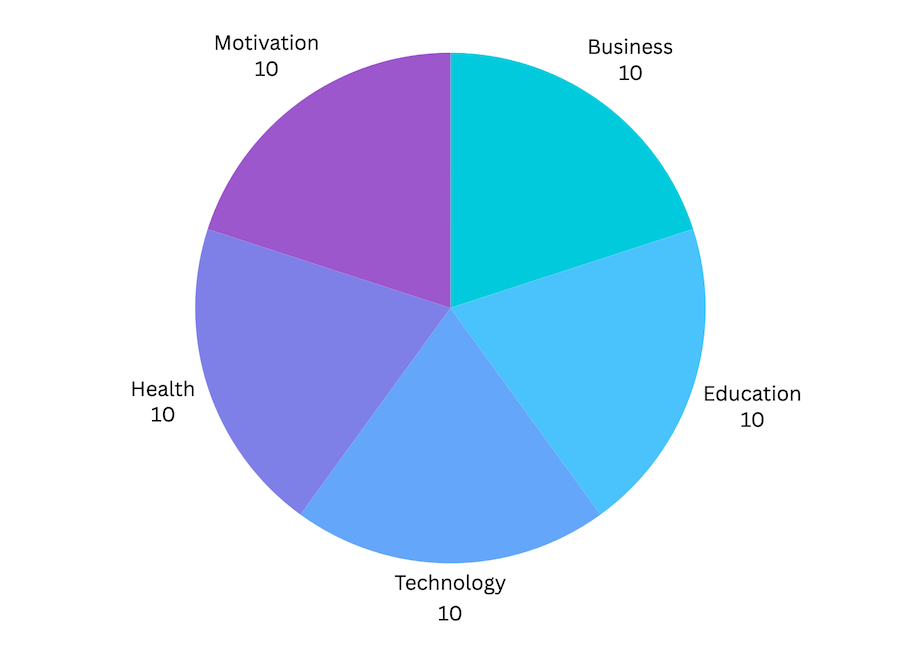If you are interested in hiring a professional speaker for an event or company meeting and have never gone through this process, you might be wondering what is involved.
We are going to provide you a step-by-step process to help you understand everything you need to do to make the speaker booking process seamless and stress-free.
In this article you are going to learn:
- The items you need to have in place before contacting a speaker
- How to work with a speakers bureau
- The importance of having clearly outlined goals
- Why you need a specific budget in place
- What the speaker booking process looks like
- Questions to ask the speaker during the screening stage
- The benefits of having an outline of your audience
Get Organized

Before contacting a potential speaker, proper preparation is crucial to ensure a streamlined booking process and avoid wasting time for both parties.
As soon as you reach out to a speaker or speaker bureau, they will have numerous questions to assess whether you are a suitable fit.
Therefore, it is essential to spend time beforehand gathering specific information that will help expedite the process.
By having key details ready, you can provide speakers with the necessary context to evaluate the opportunity effectively.
We will now address the items you should have in place before you contact a speaker which includes:
- Your goals
- Speaking topic
- Audience type and size
- Budget
- Date
- Location
Identify Your Goals

The main benefit of booking a speaker is that they are going to help you achieve your goals. So it is important that you take the time to clearly outline what they are.
What are you trying to accomplish by hiring an outside expert?
Do you want to motivate your employees?
Do you want to sell more tickets to an event by bringing in a famous speaker?
Are you looking to improve company performance such as business growth, employee engagement, or customer service?
You need to be able to clearly identify your objective first.
Ask yourself these questions:
- What problems do I want to help my audience solve?
- What specific results do we want to achiever as an organization?
- What are the key takeaways I want my attendees to leave with?
- What results will define the event as a success and how will the speaker help me accomplish this?
Remember that one of the main reasons of hiring a speaker is that they are going to help you achieve your goals.
Choose Your Topic

Once you have clearly defined your goal, now you can identify a speaking topic that suits your needs.
Your goal here to combine the previous step of identifying your goal with this step so the formula looks like this:
I am looking for X speaker to help me accomplish Y goal.
Now when you are contacting a speaker, you can say something like this:
- “I am looking for a sales speaker to help our sales team improve their performance”.
- “I am looking for a motivational speaker who can inspire our employees at our holiday event”.
- “I am looking for a team building speaker who can help our customer service agents work better with each other”.
These are just some of the examples of what will make it much easier for the people you are contacting to help them understand what you are looking for.
Outline Your Audience

To ensure the speaker thoroughly understands your needs and goals, create a concise outline describing the type of event you are creating, your attendees, including their needs and experience levels. This context is crucial for the speaker to tailor their content appropriately.
Additionally, have a general idea of the expected audience size.
Will it be an intimate seminar with around 20 attendees, or a large-scale conference exceeding 1,000 participants?
The more comprehensive the background information you can share about the prospective audience, the more efficiently the speaker can evaluate whether they are an ideal match for your event.
Set A Budget

Identifying a specific budget or budget range is crucial, as speaker fees can vary widely, from $5,000 to over $100,000. To avoid wasting time for both parties, it is imperative to set a clear and realistic budget upfront.
Just as when shopping for a house, there’s no point in considering options that exceed your financial means. Organizations often make the mistake of pursuing speakers who are ultimately unaffordable, leading to frustration and wasted effort.
Maintain discipline by focusing your search on speakers whose fees align with your predetermined budget. This approach ensures a productive and efficient process, increasing the chances of securing a speaker who meets both your qualitative and financial requirements.
Your budget should be determined by your specific goals and objectives for the event. For instance, if you are looking to book a high-profile speaker with substantial drawing power to drive ticket sales, you’ll likely need to allocate a minimum of $25,000 to $50,000, as this is the typical starting range for well-known, in-demand speakers.
However, if your requirement is for an expert in diversity, equity, and inclusion (DEI) to share best practices at an internal meeting, you can likely secure a suitable speaker for around $10,000.
It’s important to note that within the professional speaking industry, established speakers typically command fees starting at $10,000. While you may find speakers in the $5,000 to $9,000 range, they may not possess the same level of experience and reputation as their more established counterparts.
Select A Date

Identifying a date is another critical step in this process because speakers are very busy and need to know when exactly you are looking to have them speak at your event.
However, for some event planners, this can be tricky because they have either not identified the exact date or want to be flexible so they can accommodate the speaker.
If you don’t have an exact date, what you can do is select a month and then tell the speaker you are flexible and willing to work with them on a date that suits them in that month.
But do not attempt contacting a speaker with a TBD or unknown date as this will just frustrate them wasting everyone’s time.
Select A Location

Regardless of whether your event or meeting is taking place at an external venue, your office premises, or virtually via a platform like Zoom, it is imperative to have the location finalized before reaching out to potential speakers.
It is especially crucial for higher-profile speakers, as they will likely decline to consider your event unless you have secured a professional, reputable venue.
Established speakers have specific requirements and expectations when it comes to the event setting, audiovisual capabilities, and overall production values. Failing to provide these details from the outset may immediately disqualify your opportunity in their eyes.
By having a confirmed venue locked in, you not only show speakers that you are organized and committed to creating a successful event experience, but you also provide them with the necessary context to assess if the location and associated amenities align with their standards and technical needs.
Contact A Speakers Bureau

Now that you have all the necessary information that a speaker will need to consider your request, you can contact a speakers bureau.
There are over 100 speakers bureaus that you can work with and they each have their own flavor and preferences when it comes to the speakers they will recommend.
You can either browse their website directory yourself or have an agent send you some suggestions based upon your needs to help you find a speaker.
Because there are thousands of speakers to choose from, one of the main benefits of working with a bureau is that they can help expedite the process since they have a deep understanding of the speakers who are available and can also meet your requirements.
Speaker availability is a fluid and ever-changing landscape, which is where the expertise of a speakers bureau can prove invaluable in guiding you through the process.
An experienced agent has their pulse on the scheduling dynamics of various speakers, allowing them to efficiently navigate availability challenges and present suitable options that align with your event timing.
Here is what this process looks like when working with a bureau:
Step 1 – You get on a call (or email) with the agent and explain to them your needs.
Step 2 – They will ask you a series of questions such as your budget, goals, previous speakers, audience, and all of the information you should have gathered.
Step 3 – They will send you a curated list of speakers.
Step 4 – You send them feedback on what you like or don’t like about the suggested speakers.
Step 5 – They send you more suggestions until you narrow it done to a few potential speakers.
Step 6 – Then you begin the interview and booking process
Interview the Speaker

Once you have culled a list of potential speakers, now it is time to talk to them directly to make sure they are a good fit for your needs.
This will be your interview process and you should have some questions ready for them as this will help you select the right speaker.
You will want to address their qualifications, experience, availability, speaking style, fees, travel, collaboration, customization, and requirements.
Here is a sample list of interview questions to ask a speaker.
Negotiate Your Needs

Once you have interviewed a handful of speakers, you should try and narrow it down to two or three speakers that you want to book.
The reason you want to have at least a couple is because now you are going to begin the negotiating process.
Everything is generally fine when you are in the exploration phase.
But once you get down to the “nitty gritty”, this is where things can sometimes fall apart because the speaker you want may not be able to meet all of your requests.
So you will need a backup plan.
Start with your number one speaker and try and get everything you want in the negotiation process.
You will need to remain flexible but firm because it is almost impossible to get everything you want.
Remember, negotiation is about win-win and you want the speaker to also be getting what they need to be excited to speak at your event.
Here are some common needs that meeting planners or event organizers want to discuss with a speaker during the negotiation process:
- Fee Schedule
- Required equipment
- Photo opportunity
- Duration of presentation
- Travel Policy/Land & Air
- Recording of the presentation
- Repurposing the content
- Handouts and materials
- Flexibility in customizing the presentation
Sign Contracts & Make Payment

After you have found common ground in the negotiation process, now it is time to sign the contract and make a payment.
Some speakers will require payment in full while others may only require a deposit.
You can work with your agent who will help facilitate all of the paperwork.
Travel & Preparation

Once you have booked your speaker by paying a deposit and signing the contract, now it is time to start preparing for the event or meeting.
This includes travel, equipment, and any information they need from you so that they can start customizing their presentation for you.
You will need to coordinate with them to ensure all their needs are being met in their rider.
Pro Tip: A rider in a speaker contract refers to additional requirements or stipulations that the speaker has beyond the standard terms of the agreement. The rider essentially outlines the optimal working environment and logistical needs for the speaker.
Pre-Event Call

Anywhere from two to four weeks out before the event, its time to have a call with the speaker and the bureau to go over everything. This call serves as a final opportunity to meticulously review all details and requirements, aligning expectations between all parties involved.
During this call, refer to a comprehensive checklist and make sure you are addressing every detail to avoid any oversight or miscommunication.
Neglecting even a minor detail could potentially derail the entire event experience, as all it takes is one small mishap and the entire event is shot.
This pre-event call is an invaluable chance to get everyone on the same page, addressing every need to provide the speaker with the optimal conditions for a successful presentation.
Day of the Event
On the day of the event, if you have followed the previous eight steps exactly as outlined, at this point you should really just be focusing on executing the plan.
Yes, the bureau will make themselves available but it should all be sorted out by this point unless there are last minute changes being made.
Post-Event Evaluation
After the event is done, it’s good to have another call and let the bureau know how things went.
Don’t be shy in telling them what you think needs to be improved upon.
They want your business again so make sure you are clear about what you liked and what could use some improvement.
Need help hiring a speaker?
Fill out this form and we’ll have an agent follow up with you.
